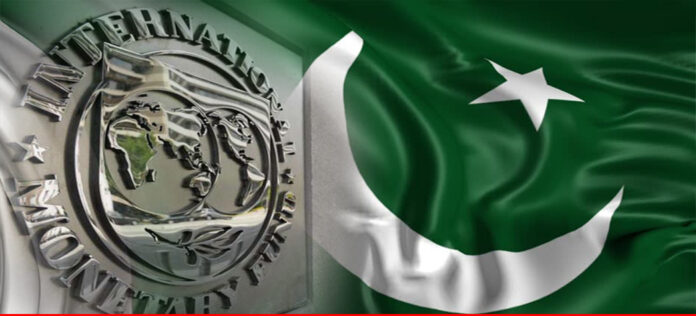- PPP Chairman declines attending sessions, claims they may not necessarily vote in favour of the budget.
Finance Minister Muhammad Aurangzeb presented the first federal budget of the incumbent government on Wednesday with a total outlay of Rs 18.9 trillion amidst ruckus from the opposition benches as well as deepening fault lines within the government coalition.
The budget session began two hours late because the Pakistan Peoples Party (PPP) expressed its discomfort with attending the session because they had not been consulted regarding the budget. A government delegation led by the Deputy Prime Minister managed to convince the PPP members to attend the session, but the party’s Chairman stayed away from proceedings.
The budget for the upcoming year aims for a modest 3.6 per cent GDP growth, and sets an ambitious Rs13tr tax collection target, raising taxes on salaried classes and removing tax exemptions for the rest.
Aurangzeb acknowledged the challenges faced by Pakistan’s economy, which had been struggling with depleted foreign reserves, a 40 per cent depreciation of the rupee, stagnant economic growth, and soaring inflation that pushed citizens below the poverty line.
The budget was an interesting one for Prime Minister Shehbaz Sharif in particular. The last federal budget was also presented by his government, but he was not around to see it through completely because of the six month stint of the caretaker setup. He is now following up with a budget that is quite similar to the last one in that it focuses almost entirely on meeting the conditions of the IMF, which Pakistan is pursuing an even larger bailout package with.
Revenues and expenditures
The federal budget for fiscal year 2025 has a total outlay — the sum of expenditures and net lending of funds — of Rs 18.877 trillion, representing a 30pc increase from the previous year’s budget.
The government has proposed Rs 17,203 billion for current expenditure in the FY25 budget, a substantial 29pc increase from the previous year. To meet these expenditures, they have set an ambitious target of over Rs 13 trillion from taxation. They have also tried to bolster non-tax revenue, a significant move being the increase of the Petroleum Development Levy (PDL) which the government increased by Rs 20 to Rs 80 at maximum capacity. The government is hoping to collect a massive Rs 1.3 trillion through the levy even though it will mean a significant increase in the price of petrol.
Interest payments, or debt servicing, have surged 34pc to Rs9,775 billion, consuming more than half of total budget outlay and becoming, like last few years, the government’s single largest expense. Of that, defence expenditure constitutes Rs2,122bn, 17.6pc higher than last year’s budget, making up 1.71pc of GDP, largely unchanged from last year.
Pakistan’s total revenue for fiscal year 2025 is budgeted at Rs17,815 billion. After accounting for provincial transfers of Rs7,438 billion, the net revenue stands at Rs10,377 billion, representing a significant 48.7pc increase from the previous year.
Aurangzeb highlighted the urgency of tax system reforms, citing Pakistan’s lagging tax-to-GDP ratio compared to other countries.
“The prime minister is closely monitoring the digitalisation of tax policies and FBR’s administrative reforms. Our goal is to broaden the tax net without burdening existing taxpayers,” Aurangzeb said.
The government has set an ambitious tax collection target for the Federal Board of Revenue (FBR) at Rs12,970 billion, a 38pc increase from last year’s goal.
Aurangzeb expressed the government’s commitment to tackling inflation, a top priority, and noted significant progress in reducing price pressures.
“Inflation had surged to 38pc a year ago, with food inflation reaching 48pc, causing hardships for low-income households. I’m pleased to report that our improved economic strategy has successfully brought inflation down,” Aurangzeb said.
The government has set an inflation target at 12pc for next fiscal year, aiming to rein in prices.
PSDP concerns
The government has allocated Rs3,792.2 billion for the Public Sector Development Programme (PSDP) in FY25, a 40pc increase from last year’s Rs2,709 billion.
The total federal PSDP, which includes state-owned enterprises and public-private partnerships, has received a boost with an allocation of Rs1,696 billion, representing a 47.5pc increase from last year’s Rs1,150 billion. Provincial PSDP allocation, on the other hand, has risen 34.4pc to Rs2,095 billion, up from Rs1,559 billion in the previous year.
However, this remained a sensitive subject because of the PPP. Earlier, PPP leader Khurshid Shah, speaking to reporters, said the party had reservations with regard to the Public Sector Development Programme (PSDP) budget and that the PPP should have been taken into confidence for the budget. “It was decided that the PSDP for the four provinces would be decided together,” he said while speaking to the media.
“We are in the same boat. If something goes wrong, it would be not just for the PML-N, but for us as well [as allies],” the PPP leader said, adding that the decision to not take part in the speech was to protect their party.




